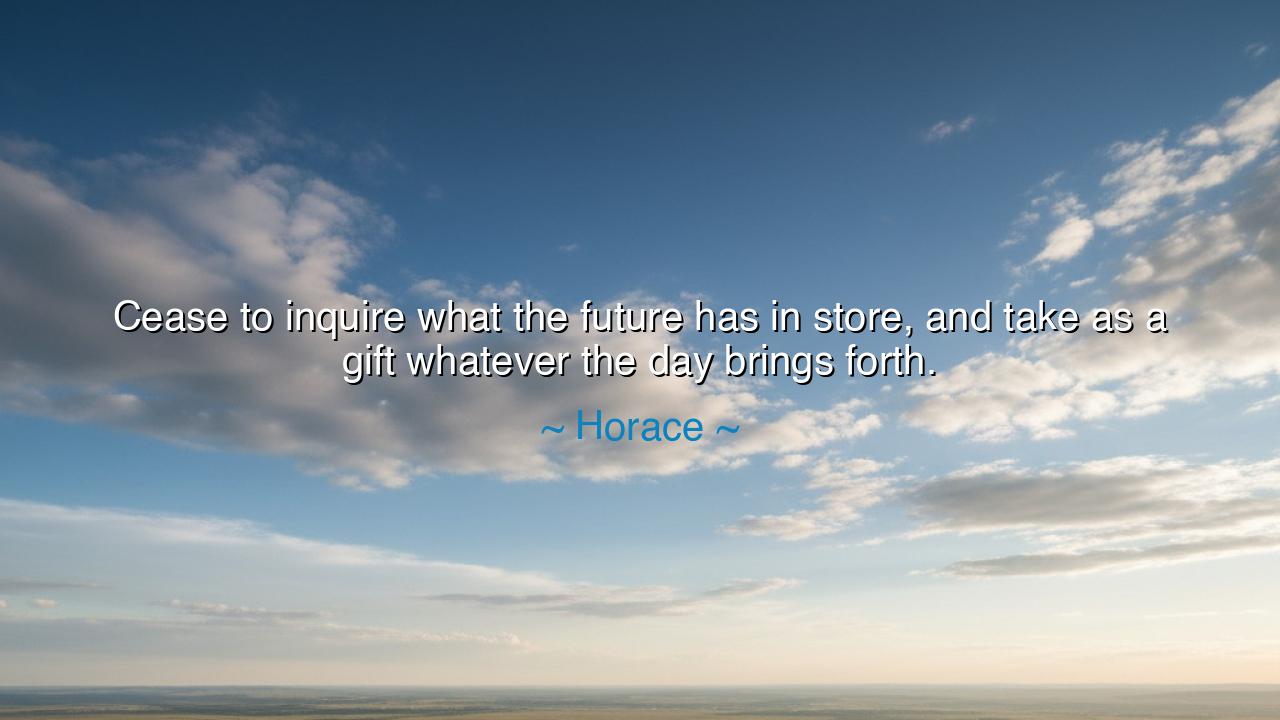
Cease to inquire what the future has in store, and take as a gift
Cease to inquire what the future has in store, and take as a gift whatever the day brings forth.






Horace, the great Roman poet, speaks to us across the ages with a wisdom that echoes deep within the human soul: "Cease to inquire what the future has in store, and take as a gift whatever the day brings forth." These words, simple yet profound, carry with them a powerful reminder about the fleeting nature of life and the futility of seeking certainty in a world defined by change. In a time when men and women are forever bound to hope for tomorrow, Horace urges us to embrace the present, to accept the day for what it is, and to let the future come as it will—without worry or fear.
To live in the moment, as Horace advises, is not a call to abandon all ambition or purpose; rather, it is an invitation to find peace in the now, to relinquish the heavy burden of foreseeing what we cannot control. The ancient Greeks understood this well, for the oracle of Delphi famously inscribed, “Know thyself.” The wisdom of this aphorism suggests that true understanding lies not in trying to master the unknown, but in mastering ourselves in the face of what is certain—the present moment. The future, as the poet teaches, is uncertain and often beyond our grasp. It is the present, the here and now, that we must cherish, for it is the only time we truly have.
The ancients lived by a simple principle: to endure the present trials with grace, for only through acceptance could they hope to live virtuously. Consider the story of Socrates, the philosopher who was condemned to death by the very people he sought to enlighten. As the time of his execution drew near, Socrates faced his fate with remarkable composure. He did not fret over the future nor beg for mercy; instead, he embraced the moment, drinking from the cup of hemlock without fear, knowing that his life was not in his control. His serenity in the face of death is a profound demonstration of what Horace means: the future will come as it will, and it is the wisdom to accept each day’s gifts, however they may appear, that marks the true philosopher.
In more recent history, the life of Anne Frank serves as another testament to the wisdom of living in the moment, though she lived in a time of unimaginable turmoil. In her diary, written during the harrowing years of World War II, Anne never ceased to find moments of beauty and wonder amidst the darkness of hiding from the Nazis. Despite the uncertainty of her future, she chose to find joy in the small things, whether it was the blooming of a tree outside her window or the words of a favorite book. Her courage lay not in the anticipation of a better tomorrow, but in her ability to cherish what she had today, in whatever form it took.
The true gift of Horace's wisdom is found in the practice of acceptance—the art of receiving life as it comes, without resistance. It is not that we should forsake our plans or ambitions, but rather that we must remember that the only time we truly have is now. How often do we spend our days consumed by thoughts of what might come, only to find that the future is nothing like we imagined? The lesson is clear: fretting over the future is a wasted effort. Instead, we should embrace each day, no matter how it unfolds, and find joy in the simple blessings that life provides.
So, let us look to our own lives and reflect on how we might follow Horace's counsel. What would happen if, instead of obsessing over the uncertainties of tomorrow, we allowed ourselves to be present in the now? If we ceased to inquire about what the future has in store, we might find that each day brings with it its own gift—whether in moments of joy or sorrow, for both are part of the great flow of existence. In embracing the day, we free ourselves from the tyranny of the future and open ourselves to the beauty of the present.
The lesson is one of peace and clarity: to trust that the future will unfold as it is meant to, and to live fully in the present, no matter what it brings. We cannot control time, but we can control how we spend it. Let us, therefore, receive each day with an open heart, as a gift, knowing that the future is uncertain, and the present is all we truly possess.






AAdministratorAdministrator
Welcome, honored guests. Please leave a comment, we will respond soon